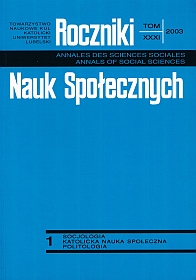Świadomość potoczna w ujęciu Petera L. Bergera i Thomasa Luckmanna
Abstrakt
An analysis of consciousness is one of the key issue of the sociology of knowledge. Both the initiators and classics of this discipline dealt with it. Berger and Luckmann, the founders of a new paradigm in the area under considerations, also devoted much attention to it. They were interested in the common-sense consciousness, unlike their predecessors who were occupied with political, scientific, and world-view etc. consciousness. They dealt with this kind of consciousness in their most prominent book The Social Construction of Reality, and in numerous papers written separately by each of the authors. This paper puts together and orders various dispersed statements as regard the common-sense consciousness, in order to present it in a compact and complete picture.
Bibliografia
Abercrombie N.: Class, Structure and Knowledge. Problems in the Sociology of Knowledge, Oxford: Basil Blackwell 1980.
Berger B., Berger P. L.: Nasz konserwatyzm, tłum. M. Tabin, „Aneks – Kwartalnik Polityczny” 1989, nr 53, s. 114-127.
Berger P. L.: Four Faces of Global Culture, „National Interest” 1997, No 49, s. 23-29.
Berger P. L.: The Culture of Liberty: An Agenda, „Society” 35(1998), s.407-413.
Berger P. L., Berger B., Kellner H.: The Homeless Mind. Modernization and Consciousness, New York: Vintage Books 1974.
Berger P. L., Luckmann Th.: Społeczne tworzenie rzeczywistości, tłum. J. Niżnik, Warszawa: PIW 1983.
Bourdieu P.: Reguły sztuki. Geneza i struktura pola literackiego, tłum. A.Zawadzki, Kraków: Universitas 2001.
Bowles S., Gintis H.: Schooling in Capitalist America, London: Routledge1976.
Buczkowski P.: Wiedza, wartości i działanie społeczne. Próba określenia przedmiotu socjologii wiedzy, „Kultura i Społeczeństwo” 1985, nr 1, s. 201-218.
Czerniak S.: Między filozofią a socjologią. Klasyczne i postklasyczne koncepcje socjologii wiedzy, „Kultura i Społeczeństwo” 1985, nr 1, s. 75-94.
Eberle Th. S.: A New Paradigm for the Sociology of Knowledge: „The Social Construction of Reality” after 25 Years, „Schweitzerische Zeitschrift für Soziologie” 1992, Nr 2, s. 493-502.
Foucault M.: Historia szaleństwa w dobie klasycyzmu. Tłum. H. Kęszycka, Warszawa: PIW 1987.
Informacja Bieżąca nr 54, Warszawa: Polskie Towarzystwo Socjologiczne 1998.
Knoblauch H.: „Niewidzialna religia” Thomasa Luckmanna, czyli o przemianie religii w religijności, tłum. D. Motak, w: T. Luckmann, Niewidzialna religia, Kraków: Zakład Wydawniczy „Nomos” 1996, s.7-41.
Law J.: Power, Action and Belief. A New Sociology of Knowledge?, London– Boston–Hanley: Routledge and Kegan Paul 1986.
Lefferty W. M.: Externalization and Dialectics: Taking the Brackets off Berger and Luckann's Sociology of Knowledge, „Cultural Hermeneutics” 1977, No 4, 139-161.
Luckmann Th.: Common Sense, Science and the Specialization of Knowledge, „Phenomenology and Pedagogy” 1(1983), No 1, s. 59-73.
Luckmann Th.: Grundformen der gesellschaflichen vermittlung des wissens; kommunikative gattungen, „Kölner Zeitschrift für Soziologie und Sozialpsychologie” 1986, Nr 27, s. 191-211.
Luckmann Th.: Le paradigme communicatif dans la „nouvelle” sociologie de la connaissance, „Soci'et'es”, 1997, No 55, s. 89-98.
Luckmann Th.: On Meaning in Everyday Life and in Sociology, „Current Sociology” 37(1989), No 1, s. 17-29.
Mannheim K.: Myśl konserwatywna, tłum. S. Magala, Warszawa: Kolegium Otryckie 1986.
Scheler M.: Problemy socjologii wiedzy, tłum. S. Czerniak i in., Warszawa: PWN 1990.
Tuchańska B.: Socjologia wiedzy Petera L. Bergera i Thomasa Luckmanna, „Kultura i Społeczeństwo” 1985, nr 1, s. 229-232.
Young M.: On the Politics of Educational Knowledge, „Economy and Society” 1972, No 1, s. 194-215.
Ziółkowski M.: Przyczynek do pojmowania świadomości społecznej, „Poznańskie Studia z Filozofii Nauki” 1984, nr 8, s. 9-36.
Ziółkowski M.: Znaczenie, interakcja, rozumienie. Studium z symbolicznego interakcjonizmu i socjologii fenomenologicznej jako wersji socjologii humanistycznej, Warszawa: PWN 1981.
Zybertowicz A.: Przemoc i poznanie. Studium z nie-klasycznej socjologii wiedzy, Toruń: Uniwersytet Mikołaja Kopernika 1995.
Copyright (c) 2003 Roczniki Nauk Społecznych

Utwór dostępny jest na licencji Creative Commons Uznanie autorstwa – Użycie niekomercyjne – Bez utworów zależnych 4.0 Międzynarodowe.


